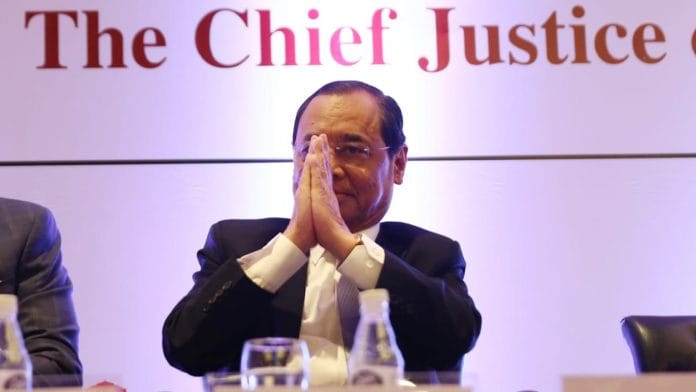New Delhi: Chief Justice of India (CJI) Ranjan Gogoi will take his four brother judges on the bench that delivered the Ayodhya verdict for dinner at a city five-star Saturday, sources in the Supreme Court’s administrative department told ThePrint.
The idea is to unwind after delivering one of the most long-awaited, sensitive verdicts in India’s judicial history.
The four judges on the bench are CJI-designate S.A. Bobde and Justices D.Y. Chandrachud, Ashok Bhushan and S. Abdul Nazeer.
In a unanimous verdict Saturday, the Supreme Court said a trust should be set up by the central government within three months to help build the Ram Mandir in Ayodhya.
The Muslims, the court said, should be given five acres elsewhere in Ayodhya to construct a mosque in lieu of the one demolished by kar sevaks in 1992.
“Possession of inner and outer courtyard will be handed over to the trustees,” the bench said, adding that the five-acre plot should be given to the Muslims by the central or state government.
Follow live updates here
AIMPLB ‘not satisfied with verdict’
While the Hindu parties were jubilant after the judgment, the All India Muslim Personal Law Board (AIMPLB) said it was not satisfied and would evaluate legal options, like filing a review petition.
“We are yet to discuss the matter within our executive committee, but we might file a review,” Zafaryab Jilani of the Babri Masjid Action Committee said.
Jilani, however, appealed to people of all communities to maintain peace, and not protest against the judgment.
The dispute over the ownership of the 2.77-acre plot in Uttar Pradesh’s Ayodhya — claimed by both Hindus and Muslims — has dominated India’s political discourse since the 1980s. The case reached a boiling point on 6 December 1992, when Hindu fundamentalists demolished the 16th-century Babri Masjid built at the site. Hindus believe the site is the birthplace of Hindu deity Ram.
Also Read: Govt trust to get disputed Ayodhya site for Ram Mandir, Muslims to get another plot: SC







Drinks on the house